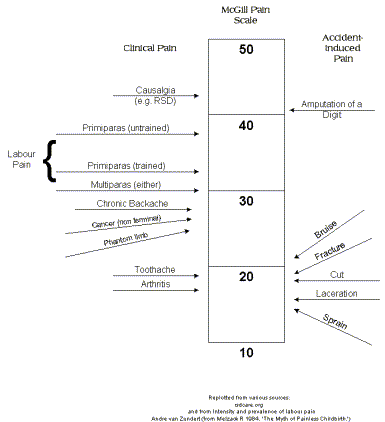Reiki and Pain
Originally from Ontario Reiki Programme Centre
www.magma.ca/~peterz/index.htm – given to The Healing Pages by kind permission
Millions of Canadians suffer from chronic pain. According
to Chronic Pain Association of Canada,[i]
over 18% of Canadians (some 5,400,000 people) suffer from severe chronic pain.
Over 70% of cancer patients experience moderate to severe pain during their
illness. At any given moment, half of all Canadians will experience some kind
of pain. A majority of Canadians experience head pain at least monthly. This
article looks at the use of Reiki for the management of chronic pain.
The following figure[ii]
shows the intensity of various types of pain on the McGill pain scale (which
rates pain from 0-50 in increasing intensity).

How much pain can Reiki be used to help with? Jeri Mills,
M.D., used Reiki for over 10 years in her OB/GYN practice and has documented
her experiences in a book “Tapestry of Healing: Where Reiki and Medicine
Intertwine.”
[iii] She observes, “Most
women slept through the first half of labor, some slept through their entire
labor with only Reiki for pain control. “[iv]
Ann Berger, R.N., M.S.N., M.D., Medical oncologist specializing
in pain treatment, Chief of the Pain and Palliative Care Service at the National
Institute of Health in Washington, D.C has said: “We use probably 50-80
percent of nonpharmacologic methods in our NIH pain clinic, meaning non-medication.
The things we use include massage, relaxation, hypnosis, and Reiki therapy,
which is also very helpful in fibromyalgia and chronic fatigue syndromes.”
[v] There is anecdotal evidence that
Reiki has been successful in the treatment of the pain associated with RSD (“causalgia”)[vi],
the most intense pain mapped on this figure.
Reiki programmes exist at a number of other palliative care
centres and chronic pain including: New Hampshire’s
Center for Integrative Medicine, the
Pain Management Center at Elliot Hospital in NH,
Ottawa’s
Sandy Hill Community Health Centre (for treating the HIV/AIDS community),
Bruce House AIDS hospice, the
AIDS-Committee of Ottawa, The
Marvelle Koffler Breast Centre recovery centre for breast cancer patients
at Toronto’s Mt. Sinai hospital,
Portsmouth Regional Hospital’s Pain Management centre,
the women’s health centre at the University of Connecticut’s
Charlotte Johnson Hollelder Center, and the
Yale/New-Haven Hospital.
The results: one double-blind study[vii]
found that “Reiki is an effective modality for reducing pain, depression,
and anxiety”; Hartford hospital reports that Reiki provides significant
pain relief for surgery patients[viii];
Edmonton’s Cross Cancer Institute concluded that Reiki showed a highly
significant reduction in pain in a pain management study including cancer. In
a study of Reiki for treating HIV-related pain and anxiety[ix],
Pamela Miles found that newly trained Reiki practitioners perceived reductions
in pain and anxiety when they performed Reiki on themselves or classmates.
Reiki reduces pain, but it also works to improve some of
the correlated effects of chronic pain, the psychological impacts: anxiety and
depression. One group[x]
specifically found that “Reiki is an effective modality for reducing …depression,
and anxiety”; a recent review of Reiki practice in the US found that hospital
“…staff, patients, and program administrators report a number of
benefits including reduced anxiety and …decreased numbers of self-reported
common gerontological complaints such as anxiety, loneliness, insomnia, and
pain…”
[xi]
Summary
Reiki therapy is safe and non-invasive. It is being used
to facilitate relaxation and recovery, decrease anxiety and treat pain[xii]
in hospices, nursing homes, emergency rooms, operating rooms,
organ transplantation care units, pediatric, neonatal and OB/GYN units.
It can be a helpful addition to conventional therapy for HIV/AIDS and
cancer patients[xiii],
[xiv].
Reiki can be learned by both the person experiencing the pain and his
or her caregivers, and can improve the quality of life of many chronic pain
sufferers.
The Ontario Reiki
Programme Centre is an Ontario not-for-profit corporation dedicated to providing
Reiki programmes in health care centres. They provide presentations, training
and treatments, and have a comprehensive website (at
www.onreiki.com) of research on this non-invasive therapy. Therapists
and teachers are registered with the Canadian Reiki Association. These articles
are presented as part of our mandate to inform people who may benefit from
Reiki that this therapy exists, and how it has been shown to apply. This material
may be used to promote Reiki and Reiki programmes in health care centres so
long as the material is used intact and includes the copyright and attribution.
Reiki is
a complement to treatment by a physician. It does not provide services
in lieu of a doctor, nor is it a medical diagnostic tool. However, there is
a growing body of opinion that integrative medicine that takes advantage of
all parts of the care spectrum as appropriate is more effective (and cost-effective)
than allopathic treatment alone.
Author: Peter
Zorzella, BASc, RT-CRA, founded the Ontario Reiki Programme Centre to make
healing through Reiki available to everyone who could benefit from it. Peter
is a registered teacher with the Canadian Reiki Association; in addition to
the work associated with the Centre, he has a clinical practice South of Ottawa.
References
http://www.chronicpaincanada.org/
http://www.manbit.com/oa/f58-1.htm
http://www.breastcancer.org/cmty_trans_2002_4_18.html
http://www.issseem.org/journal.html
http://www.harthosp.org/nursing/professionals/pdf/Newsletter-06-2001.pdf
http://www.issseem.org/journal.html
http://www.alternative-therapies.com/at/pdfarticles/0103reiki.pdf
http://www.alternative-therapies.com/at/pdfarticles/0103reiki.pdf
http://www.alternative-therapies.com/at/pdfarticles/0103reiki.pdf
Return to previous
page